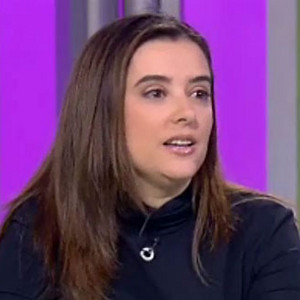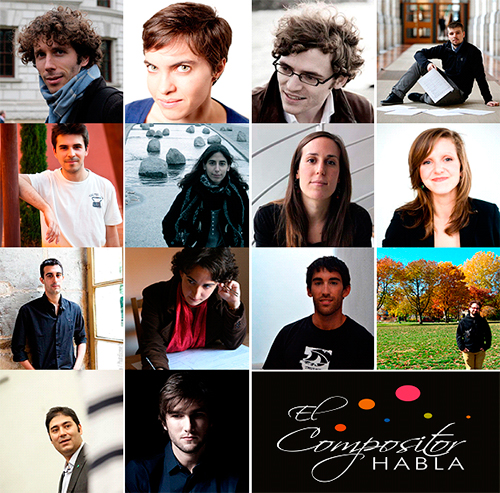Entrevistas
María de Alvear | World Edition Project 8-Interview with Lucie Vítková
07/10/2019
We have interviewed Lucie Vítková, the curator of the number 18 of Kunst musik magazine edited by World edition and this is what she has told us.
"I consist of many identities which I explore through various communities of people"
The curator of the last issue (No. 18) is Lucie Vítková. She is a composer, improviser and performer from the Czech Republic, living in New York. This edition does not discuss a specific musicological subject, but, rather, gives some genuinely stimulating insights into some of the most current developments in New York’s experimental music scene. In this issue of KunstMusik, we have women, transgender and femme authors of various backgrounds. Their perspective is refreshing, incisive and exciting.
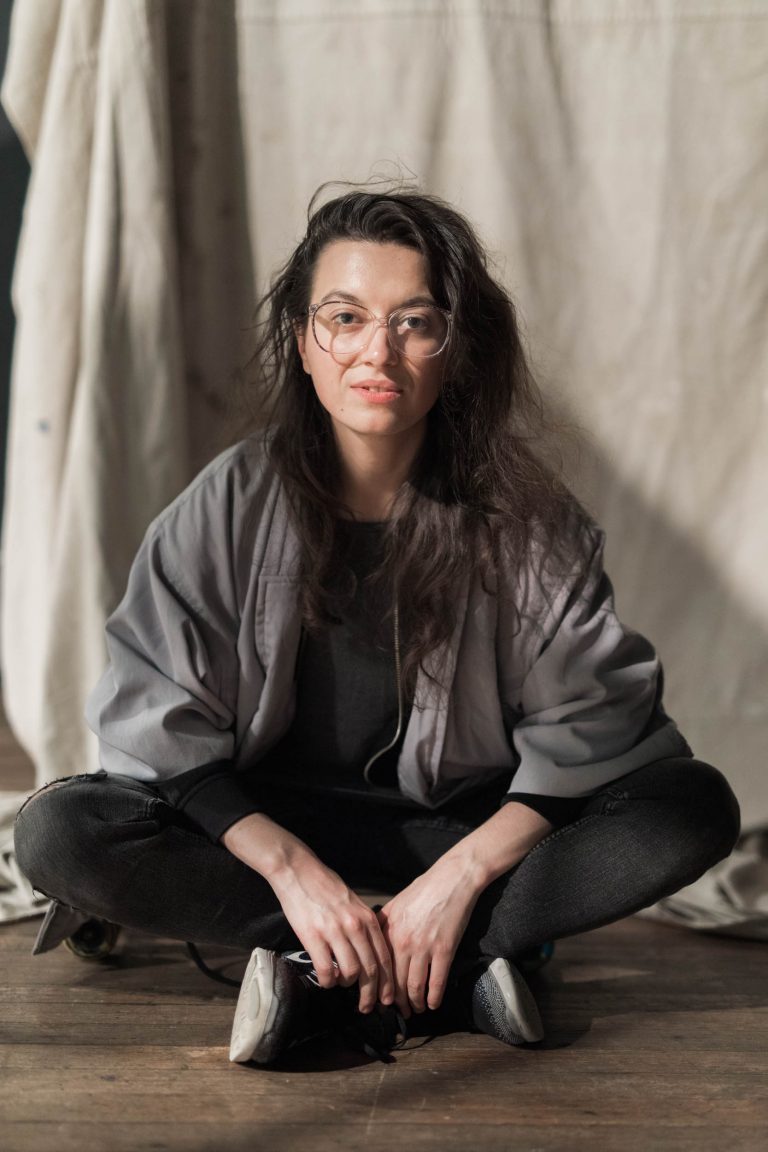 1. Ruth Prieto: You are the curator of the latest issue of the magazine KunstMusik, what could you tell us about this initiative?
1. Ruth Prieto: You are the curator of the latest issue of the magazine KunstMusik, what could you tell us about this initiative? Lucie Vítková: In autumn 2016, we met with Marc Sabat in Berlin and he suggested to me to become a curator and editor of the 18th issue of KunstMusik. I was thinking about the concept of the magazine and the ways I could contribute to it with my mind and ideas. At the end, I have decided to open it into many directions and invited composers and artists from the New York scene to participate.
2. R.P.: Who is Lucie Vítková and which characteristic defines you best?
Lucie Vítková: I am a composer, improviser and performer. I also write and make art. I am a vegan, I was born in the Czech Republic, I live in New York City and my profile is pretty international. I consist of many identities which I explore through various communities of people.
3. R.P.: What inspires you as an artist and why?
Lucie Vítková: Recently it is the environment, in both, sociological as well as in the ecological sense. I see the environment as a main force which forms our character and perception. It is important to me to include this thinking into my work to be able to modulate it constantly. I have performed in my projects where I built environments from a large amount of scores. I played in that space for extended hours to evolve new kind of perception and music. With that training, I can continue to transform myself and keep my mind more flexible in an established milieu.
4. R.P.: What are your musical roots (real or imaginary)?
Lucie Vítková: It is a mixture of things, I have started to dance at the age of four and have played the piano from the age of six. Those are the first memories of self-expression for me. There were a lot of influences through my education and also through living in the Czech Republic till my 20´s. I have heard a lot of pop music in TV and also listened to local hardcore bands, while playing classical piano repertoire, singing in a choir and tap danced competitively. After that, I studied classical accordion, and composition, and I was impressed by works of Olivier Messien, Iannis Xenakis, Vítězslava Kaprálová or Hanne Darboven. During the summers, I used to play popular tunes on accordion, as a work in restaurants in abroad. Next to the music, in my master degree in composition, I have learned to dance Flamenco, Javanese and African dances or have made DIY instruments. In my later studies, I centered my research on Christian Wolff and social-political aspects in music. I played in an Indian Raaga band and in a Japanese Gagaku Ensemble as a hichiriki player. The important moments were meeting and studying with composers and theorists George Lewis and Miya Masaoka, musicologists Ellie Hisama and Susan Cusick, ethnomusicologist Alessandra Ciucci, anthropologists and theorists Elizabeth Povinelli and Branka Arsić, philosopher Lydia Goehr and hichiriki master Hitomi Nakamura. I have been always listening to sounds of everyday life and I have my field recordings archive. I play electronic instruments, especially, synthesizer and feedback. Part of my work is related to Czech folklore music. Moreover, I have also collaborated with Czech visual artists such as Dalibor Chatrný, Pavel Korbička and Jolana Havelková. The most recent roots are my ensembles in New York, with which I have been learning to work as a group.
These and many more events and encounters influenced the music I do now.
5. R.P.: In this personal "inventory" that we all have of noises, sounds, music and songs, what can you tell us about your soundscape?
Lucie Vítková: In some way, I wrote about it in the previous question. In my sound, I always use different ratios of pitch and noise, look at the space I perform in and bring its parameters into my music, if the piece is more open towards improvisatory manners. Since 2011, I have been using a sonification process to bring everyday life objects into musical form. Lately, I have also been interested in social aspects in music and the overall context of music making. It shows on my scores and on the sound organization which is more related to the relationships of people in the ensemble.
6. R.P.: Can you define contemporary? And, in which way Lucie Vítková is contemporary?
Lucie Vítková: From the education point of view, I define contemporary as an academic style of classical music made at the end of 20th century and in the 21st century in Europe and in the USA, which is connected with the classical canon.
The contemporary music in broader sense would probably be everything people make now everywhere.
I have always lived between academic contemporary and underground experimental scenes in many countries, connecting different people and approaches together.
"I try to see contemporary music as a mixture of things"
7. R.P.: ¿How do you see the contemporary music scene today?
Lucie Vítková: I see it embedded in different communities gathered around universities and in composers, focused on classically notated music, composing for established bodies of musicians and working in a frame of classical music. Sometimes, the contemporary has a notion of resistance towards European classical music of the past and challenging the established. These days, it might be more and more connected with experimental and electronic music scenes. It might also depend on where the music scene is located. Western classical music entered lots of different places in the world.
8. R.P.: What is your main obsession as a composer when working?
Lucie Vítková: I don’t feel that obsessed lately. I try to research a subject or idea as best as possible and find ways to put it out. I can see that compositions can be so incomplete. Maybe it is impossible to finish a piece, though, that might also depend on a form. You can create an illusion of the beginning and the end with a form, which brings a satisfaction from finished work. I use forms which don’t have that, trying to play a different game.
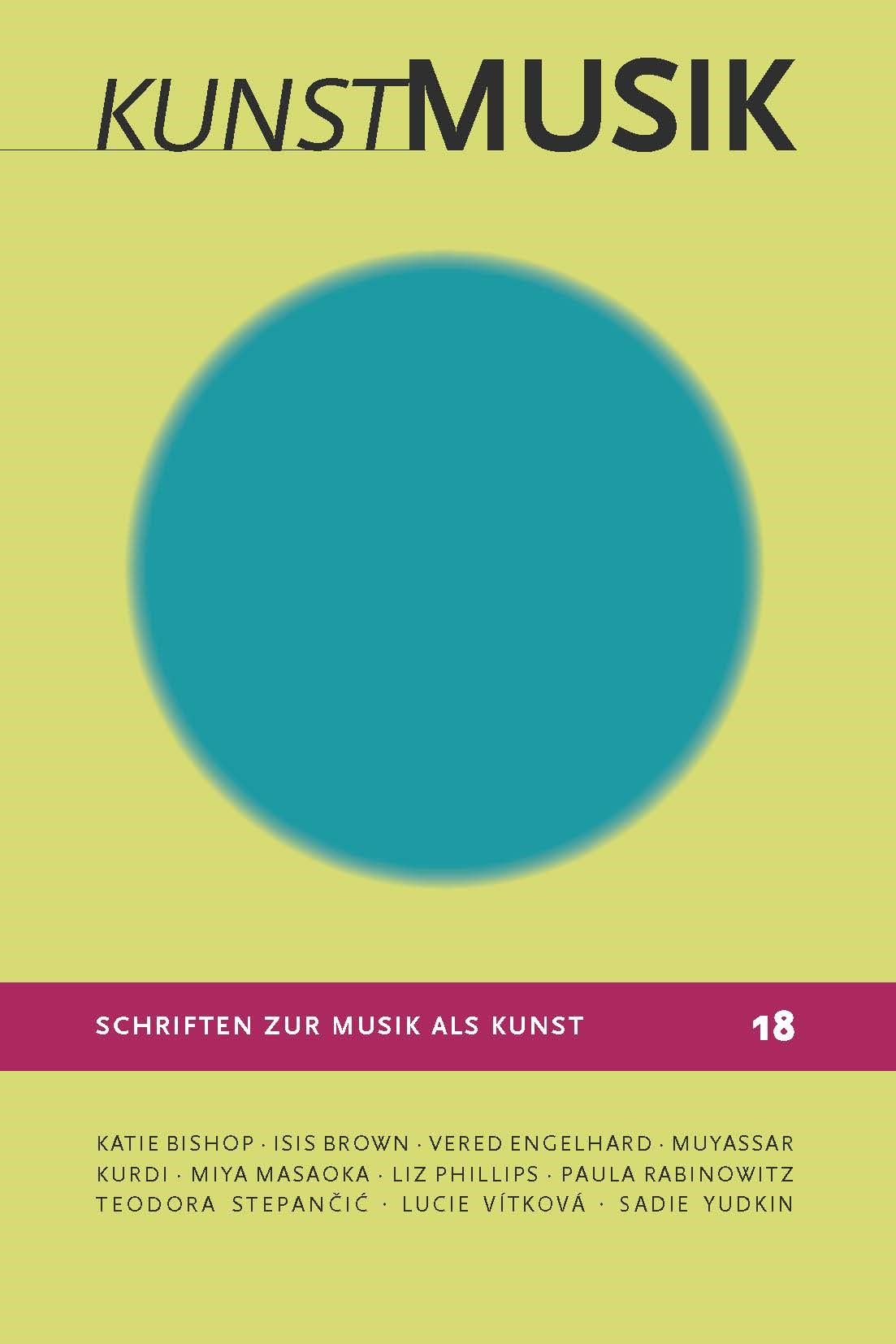 9. R.P.: What have been the criteria to choose the artists who have participated in this number?
9. R.P.: What have been the criteria to choose the artists who have participated in this number? Lucie Vítková: I was thinking about the concept for a long time and had different ideas how to frame it. At the end, I decided to work with the gender statistics of the KunstMusik magazine (which are mainly focused around white male composers from Europe and USA) and to portray the vibrant music scene of composers in New York, I have admired for some time.
You can read in my introduction about the conception of the writing which I also opened up to include many different forms.
10. R.P.: This is a number made by women and transgender authors, is there equality in the world of composition?
Lucie Vítková: I tried to be diverse in my choice of candidates. There are women, transgender, non-binary and femme authors in the magazine as well. The group consists of people with different backgrounds and heritages.
I don’t think, that there is equality in the world of composition, you can see it on the statistics of music festivals or on the previous KunstMusik magazines.
11. R.P.: Sometimes I see that the participation of women composers and performers in the programs of the seasons of big auditoriums is more due to quotas than to true criteria of valuing female talent and making artists visible. What do you think of this?
Lucie Vítková: I think you need to keep making access and revalue what is considered to be good and bad and how the musical aesthetics were created in the first place. Sometimes, we behave like the evaluation of “good music” would be an objective term. I don’t think like that, I see it resulting from opinions and social constitution of a music community. If you change the people in the group, the consideration of what is “good” will reform with them.
If these quotas help to make access for people who are not represented, then it makes sense. Another thing is if they are targeted by those lists, which might be dangerous. But in general, I consider sharing space as a good thing.
12. R.P.: It is still necessary to make visible women in music?
Lucie Vítková: Yes, the visibility is still very low. I think we live in an illusion that it is becoming better. It is still so fragile that, if we stop, the ratios might go back to the beginning. I have talked with women artists and composers who have advocated for women´s rights in music in the 1970´s and they have also thought that the representation of women in music became better back then. Today, they are a bit shocked that not much has changed and they have to engage in activism and participate in the same change again.
Another marker for this might be this interview. The KunstMusik magazine and the 18th issue is about music and half of these questions are centered on gender. In some way, it shows that women still are not normalized in a public space, or when they gather or create a group. This is a bias men don’t have to face and there are lots of male bands, magazines or ensembles.
13. R.P.: You are a composer and also a teacher, in your opinion, how is the approach to contemporary music and new music, as teachers, programmers, composers ... is taught, disseminated, well explained ?, are we wrong?
Lucie Vítková: We could talk about the historical canon of contemporary music. The syllabus of the music education classes seems to promote one kind of story, promoting specific people and aesthetics. In 2019 and forward, I want to look more on the social aspects of music and see where diversity can bring us new music and approaches.
"I think we need to take a break from “genius” people for a bit and see how the aesthetics can reform with a broader group of people"
14. R.P.: What are we doing to make our music and the ‘music world’ more inclusive?
Lucie Vítková: We need to look at who the music is for or who is composing it. Despite is a new MAX/MSP patch or extended technique for an instrument being discovered, if the environment keeps to follow discrimination, patriarchy and capitalism, it doesn´t make that much of a difference. It doesn´t change the imbalance of the environment it was created in. That way, I think it is really important to include the context of music making as one of the parameters to work with.
We can organize ensembles and have discussions about gender and diversity in music. We can give interviews, make new friends or build diverse communities. I have been involved in the GRINM (Gender Relations in New Music), which was originally formed as GRID (Gender Relations in Darmstadt) in 2016. The initiative looks at the music festivals and discusses new perspectives on curatorship and the music community.
In my compositions, I am thinking about a group of people I am composing for, and make space for their expression, so the piece changes with every performance. I have been working with this parameter for some time, to deepen the ways I work with the dynamics of the group.
15. R.P.: Why do you think that it is important to support the new creation and composers of today?
Lucie Vítková: I see music as a potential force or resource for change. Often times, music functions as an alternative to the mainstream or extends it. It can elevate people, and people can find some kind of release, motivation or even hope in it. It can contribute to social change and influence the way we live. It keeps things moving.
16. R.P.: Is it difficult to perform avant-garde projects in these times of crisis?
Lucie Vítková: Which crisis do you mean? With my ensemble, we have been thinking a lot about the climate emergency and what does it mean to be an artist in these times. Can we help or contribute to the situation? I think so. We should keep thinking about the theme and find new sets of mind for this new era. We have organized a concert, with my group, called OPERA Ensemble on Climate Change, where we tried to do it.
I would like to quote Vered Engelhard, who commented on our OPERA on Climate Change Site, where we post news, thoughts and art, concerning the climate:
“someone had asked what could music ever do towards climate change. thinking deeply about the political dimension of music composition, our ensemble at least seeks to experiment with alternative modes of sociality, ways of being together that can widen our definitions of social organization.”
17. R.P.: What are your composing expectations?
Lucie Vítková: It is a hybrid form of paper and project proposal I wrote for the last KunstMusik. In this text, I talk about the audience and its role in music making. I described my project “Composing Expectations” in which I would like to make the influence of the audience on music more visible.
18. R.P.: Where are you going from here? What are your next projects?
Lucie Vítková: You can catch me in the Czech Republic right now, where I did a couple of concerts at venues and festivals. I will be on my way to Los Angeles soon and I am going to tour Europe in February 2020 with new projects and solo performances. In April 2020, I got a residency with the OPERA Ensemble at the Watermill´s Center, a gallery founded by Robert Wilson at Long Island in New York. In the meantime, I hope to finish my dissertation on Christian Wolff´s compositional techniques and social aspects in music. Last thing so far for 2020, is in the autumn, when I was nominated for the Robert Rauschenberg Residency in Florida, where I am going to spend a month at the island, thinking about music in a creative environment.
Más información en la web de Lucie Vítková
Más información en la web de World-Edition-KunstMusik
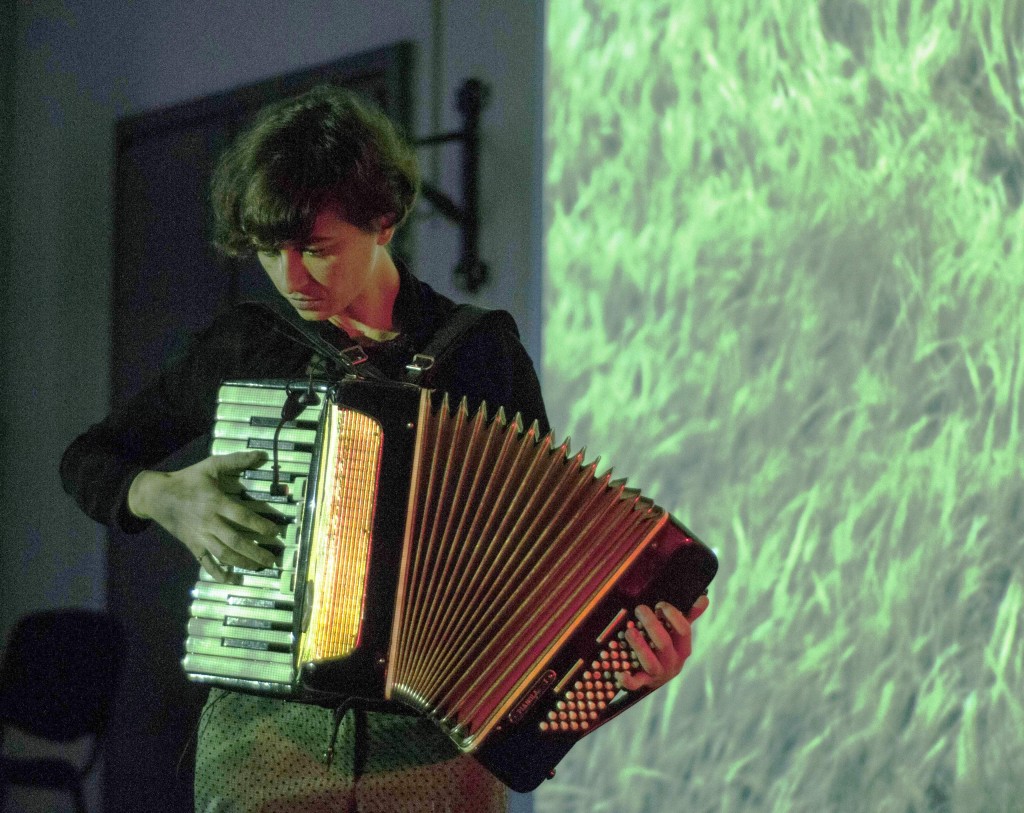 Lucie Vítková is a composer, improviser and performer (accordion, hichiriki, harmonica, voice and tap dance) from the Czech Republic, 2017 Herb Alpert Awards in Arts nominee in category of Music.
Lucie Vítková is a composer, improviser and performer (accordion, hichiriki, harmonica, voice and tap dance) from the Czech Republic, 2017 Herb Alpert Awards in Arts nominee in category of Music.In Spring 2016, she was awarded as an emerging artist of Thomas M. Messer Bohemian Creative Hub at the Czech Center New York and has been commissioned by Roulette Emerging Artist Commission Program with support of the Jerome Foundation in New York in 2017. This year, she received the 2018 Roulette Residency.
Her compositions focus on sonification (compositions based on abstract models derived from physical objects), while in her improvisation practice explores characteristics of discrete spaces through the interaction between sound and movement. In her recent work, she is interested in the musical legacy of Morse Code and the social-political aspects of music and art in relation to everyday life.
She graduated in accordion performance at Brno Conservatory in 2010 and composition at Janáček Academy of Music and Performing Arts in Brno (CZ) in 2013. During her Master Degree, she studied at Royal Conservatory in The Hague (NL) and at California Institute of the Arts in Valencia (USA). She has studied with Martin Smolka, Jaroslav Šťastný, Martijn Padding, Gillius van Bergijk and Michael Pisaro.
The photos of Lucie are by Jacob Pritchard and it has been provided by the publisher World Edition
Biblioteca
Destacamos ...
Nueva Sección Directorio
dedicada a la promoción de compositores, intérpretes, instituciones y editoriales.
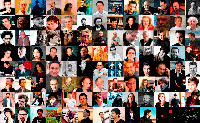
dedicada a la promoción de compositores, intérpretes, instituciones y editoriales.


